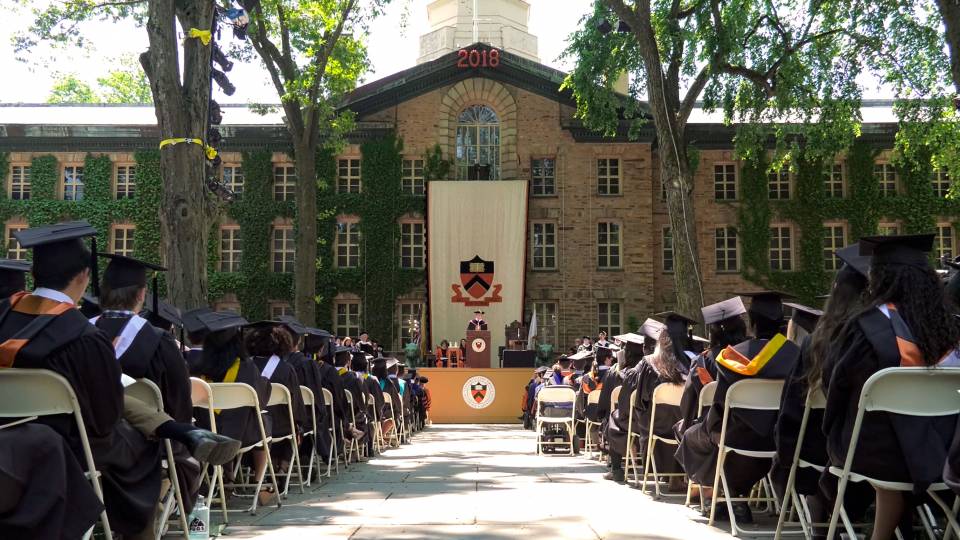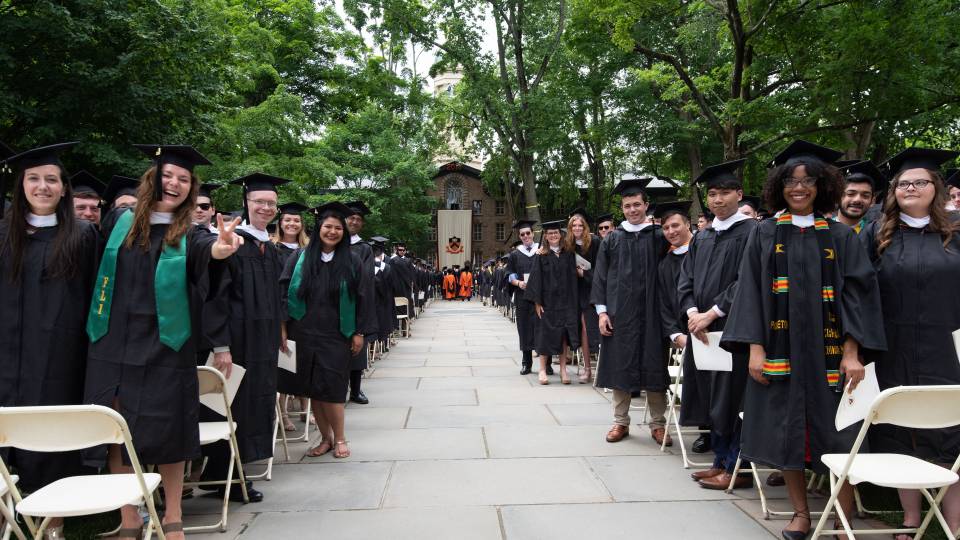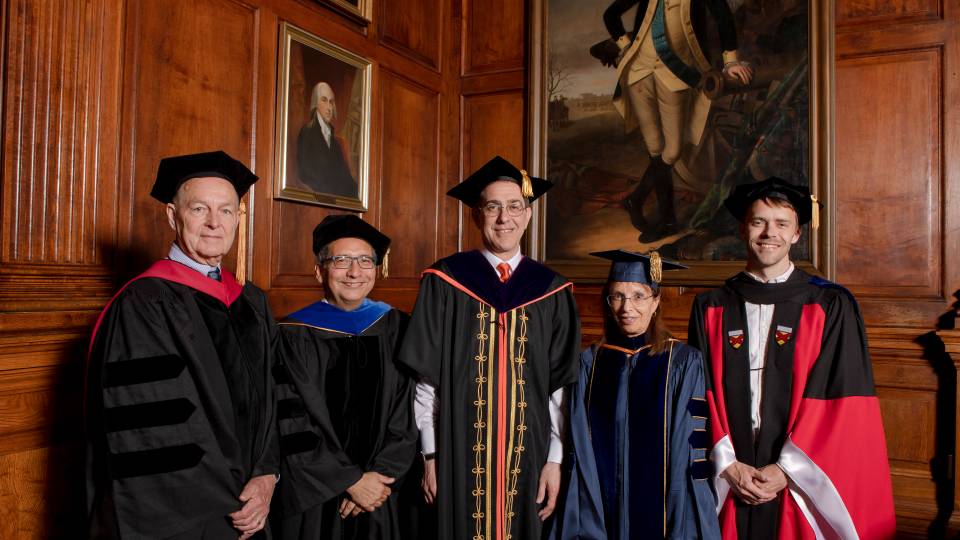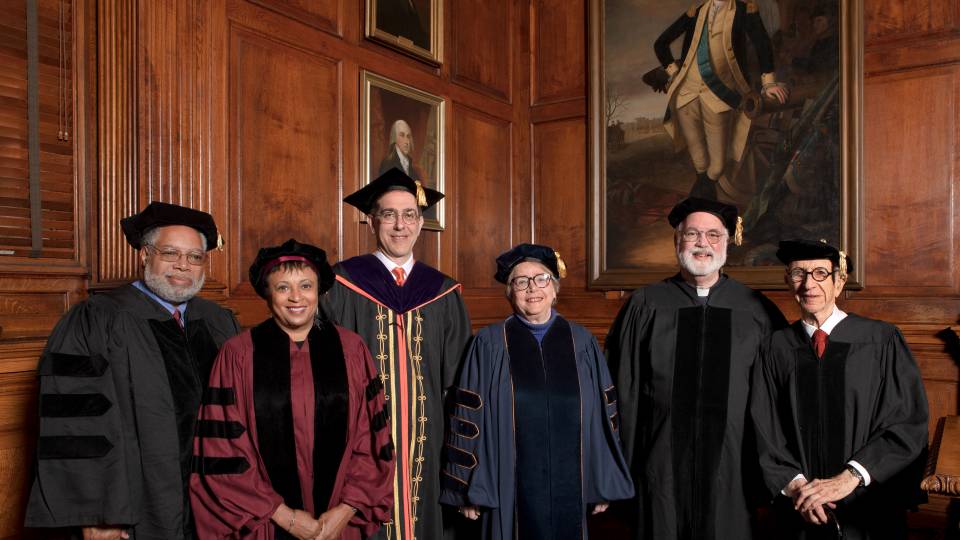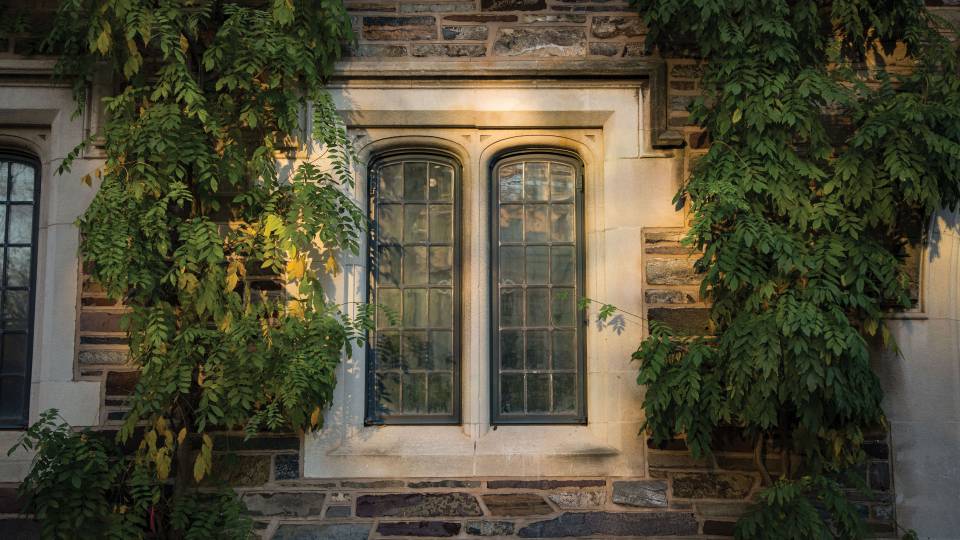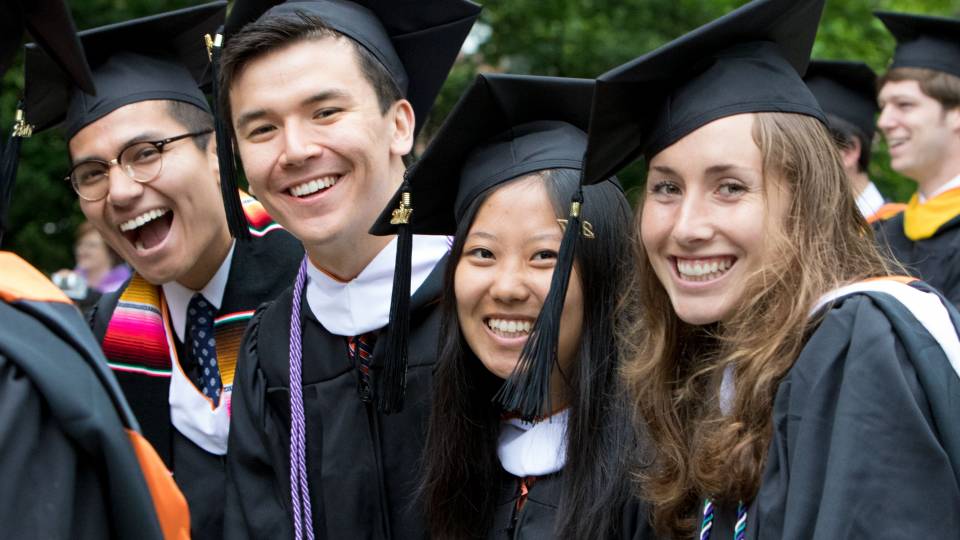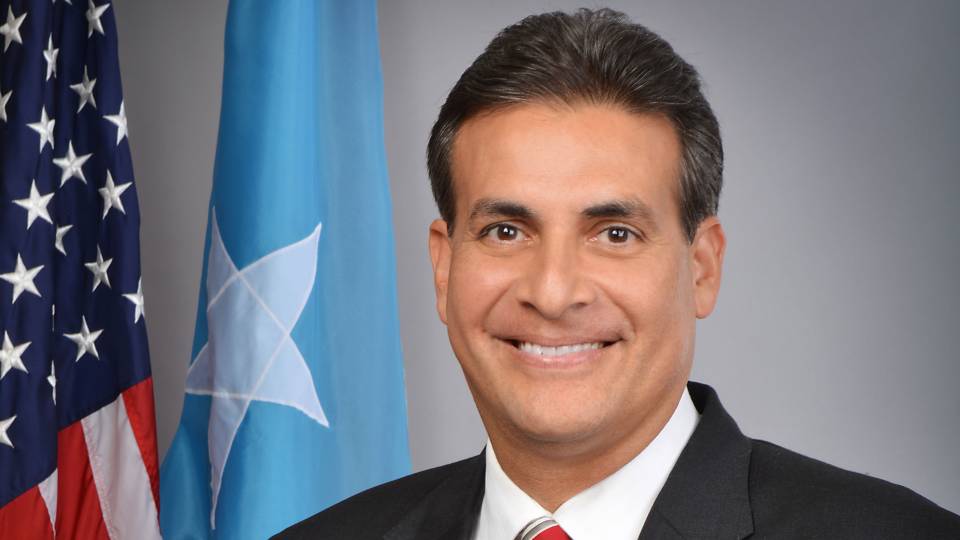Members of the Class of 2018 — Princeton’s newest graduates — leave campus through FitzRandolph Gate after the University’s 271st Commencement on Tuesday, June 5.
Speaking to graduates at Princeton University’s 271st Commencement on Tuesday, June 5, President Christopher L. Eisgruber extended congratulations and urged the Class of 2018 to become advocates for the value of a college degree.
In his address(Link is external) to students and guests seated across the sun-dappled front lawn of Nassau Hall, Eisgruber said: “I hope that all of you who graduate today, and who experience the power of education in your own lives, will become advocates for the value of higher education in our society. There is a national conversation taking place right now about the value of higher education, and we need your voice in that conversation. We need you, in other words, to help others to achieve in the future what you achieve today.”

In his address, President Christopher L. Eisgruber, the 20th president of Princeton, urged the graduating students to become advocates for a college degree.
The graduates, he said, “have completed a demanding course of study. It will transform your life in many ways. It will expand the range of vocations you can pursue, increase your knowledge of the world, deepen your capacity to appreciate societies and cultures, and provide a foundation for lifelong learning.”
Even with all of the promise and benefits that come with a degree, Eisgruber noted that there is a “strange trend” suggesting that “too many students are earning college degrees.”
“That is a very odd claim,” he said, pointing out many ways a college degree is valuable, starting with the economic evidence.
“For example, in 2014, economists Jaison Abel and Richard Deitz of the Federal Reserve Bank of New York estimated the average annual return on investment from a college degree, net of tuition paid and lost earnings, at between 9 percent and 16 percent per year for a lifetime. For the last two decades, the return on investment has hovered at the high end of that range, around 15 percent per year.
“By comparison, the historical average return on investments in the American stock market is around 7 percent per year. That is why my friend Morton Shapiro, the president of Northwestern University and a leading educational economist, says that for most people, the decision to invest in a college degree will be ‘the single best financial decision they make in a lifetime.’”
These numbers are not specific to Princeton, Eisgruber explained, “On the contrary, they are averages of all four-year degrees, in all fields, from all colleges in the United States.”
There are other significant benefits to a college degree, he said. “College graduates report higher levels of happiness and job satisfaction, even after controlling for income. College graduates are healthier than non-graduates. They are more likely to exercise, more likely to vote, and have higher levels of engagement. To these pragmatic considerations we should add the joys that come with an increased capacity to appreciate culture, the arts, the world’s diversity and the inherent beauty of extraordinary ideas.”
Adding that a college degree can help people prepare for shifting job markets and opportunities, including people who are employed in a trade, Eisgruber said, “A college degree equips you to respond to the changes — to yourself, and to the world — that inevitably occur over a lifetime.”
Therefore, “Why would anyone think we need fewer college graduates?” he asked.
He offered an answer. “Education requires high-quality teaching. Teaching, in turn, depends upon skilled labor, which is expensive. As a result, the up-front cost for education is real, large and very easy to measure. The returns are equally real and even larger, but they accrue over a lifetime, are hard to measure, and vary from person to person. It is tempting to wish that you could get more certainty at a lower cost.”
Those who think there should be fewer degrees are tempted by the short-term, Eisgruber said, which is a mistake. “They focus almost entirely on the price of college and on the salaries students might earn in their first jobs.”
Instead, he said, college is a long-term investment. “It enables graduates to develop and adapt, and it pays off spectacularly in the long run. The idea that we would be better off with fewer college graduates is a short-term swindle, a swindle that would cheat America’s young people, weaken the nation’s economy and undermine our future. We need to have the confidence to invest in our young people and to ensure that a college education is accessible and affordable for students from all backgrounds and financial circumstances.”

Graduate students applaud and celebrate during Commencement exercises on a sunny morning.
Eisgruber suggested three ways the Princeton graduates could help more students earn college degrees.
“First, become advocates for the importance of completion rates. A college education produces a tremendous return — if you get the degree.” He noted that the highest default rates on student loans involve students with small debts who leave college and do not get the boost in earnings associated with a degree.
“Second, support America’s public institutions of higher education. They are engines of social mobility and innovation,” and have experienced steep drops in state funding.
“Third, stand up for the importance of enabling more students from low-income families to earn college degrees.” Eisgruber observed that the Class of 2018 is the most socioeconomically diverse in Princeton’s 272-year history, but “other classes already at Princeton will break your record.”
The crowd applauded vigorously.
Eisgruber continued, saying that “at Princeton we believe in socioeconomic diversity because we know that to achieve excellence as a University and as a nation we must draw talent from every sector of society. We know, too, that a Princeton degree is a rocket booster for students seeking socioeconomic mobility. If we want to heal the divisions that inequality has produced in this country, we must ensure that students from low-income backgrounds receive the educations they need to develop their abilities and contribute to our society.”
In closing, as the graduates prepared to pass through FitzRandolph Gate and on to their futures, Eisgruber said: “We need more celebrations like the one we hold today, with more proud families and happy graduates ready to go out and make a positive difference in the world.”



Valedictorian Kyle Berlin, who graduated with a degree in Spanish and Portuguese, looks out at the audience on the front lawn of Nassau Hall, asking what they would say in this moment of farewell.
After jumping from the stage, Berlin takes a couple of minutes out of his remarks to ask fellow graduates how they would address such an occasion.
Berlin sprints into the crowd of graduates after leaping from the stage.
Milestones and memories
The ceremony’s two other speakers were valedictorian Kyle Berlin, a Spanish and Portuguese major from Arroyo Grande, California, and Katherine Lim, a computer science major from Atherton, California.
Berlin expressed gratitude to the University community and to families and friends. He had a confession: “I do not know what to say.” He explained that in preparing his remarks, he had asked many fellow students about what they would say in farewell. In the process, he said he found it wonderful to “hang out with other people informally talking about things that matter.”
His wish, he said, is that “we find it within us — or outside of us, I don’t really care where you find it — to be able to truly listen to others and develop a compassionate stance. ... Particularly in this moment, where meanness is mistaken for power, I wish for us to enact a compassionate togetherness.”
Berlin looked out to the crowd. “I turn this question around to you. What would you say to everyone?” He asked the people seated in the rows upon rows of chairs to turn and talk to each other — and then he jumped from the stage to have short conversations with individuals in the audience about what they “thought everyone should know or do in this moment of farewell.”
Having scrambled back on stage a couple of minutes later, Berlin said: “We want things to end and we want them not to end. We want things to change and to stay the same, termination and germination. Sitting here on graduation day, we are ready to leave and we are sorry to leave.
“There are concrete things we can do. Let’s do them.” He asked his fellow graduates to resolve to “working towards a more compassionate, more just world. I have the feeling this may be the way towards the richest sort of joy, a shared joy. Parabéns, felicitaciones, congratulations to the compassionate Class of 2018!”

Katherine Lim, a computer science major, delivers the salutatory oration in Latin.
Lim delivered the salutatory address in Latin. This Princeton tradition dates to the first Commencement in 1748, when the entire ceremony was conducted in Latin. The salutatory, Princeton’s oldest student honor, began as a formal address but today often contains humorous comments and a fond farewell to Princeton.
In her oration [English translation], Lim paid tribute to President Eisgruber and the University’s trustees; professors and their wisdom; and parents and families, those “patrons of our scholastic endeavors,” whose love supported students along the way.
Lim gave a special greeting to her “fellow scholars, companions through early morning classes and sleepless nights. Together, we have done battle with many papers and problem sets, but look! We have conquered them all!
“Now, from our home that has nurtured us let us embark on adventures into unknown lands beyond this great institution,” Lim said. “May you find success wherever your journey takes you!”
The University awarded degrees to 1,281 undergraduates in the Class of 2018, three from previous classes and 563 graduate students. It also conferred honorary degrees upon five people for their contributions to architecture, education, the humanities and public service:
- Rev. Gregory Boyle, S.J., social activist and founder of Homeboy Industries, a gang intervention, rehabilitation and re-entry program in Los Angeles;
- Lonnie Bunch III, founding director of the Smithsonian’s National Museum of African American History and Culture;
- Robert Geddes, the William Kenan, Jr., Professor of Architecture, Emeritus, at Princeton;
- R. Barbara Gitenstein, president of The College of New Jersey; and
- Carla Diane Hayden, Librarian of Congress.

In the Faculty Room of Nassau Hall, Princeton President Christopher L. Eisgruber (third from left) gathers with honorary degree recipients (from left) Lonnie Bunch III, Carla Diane Hayden, R. Barbara Gitenstein, Rev. Gregory Boyle, S.J. and Robert Geddes.
Princeton also honored excellence in teaching at the Commencement ceremony. Four Princeton faculty members received President’s Awards for Distinguished Teaching and four outstanding secondary school teachers from across New Jersey were recognized for their work.
Later in the day, a joint commissioning ceremony was held in Nassau Hall with the Princeton Army and Navy ROTC programs. Five seniors were commissioned as second lieutenants in the U.S. Army and one senior was commissioned as an ensign in the U.S. Navy. U.S. Army Chief of Staff Gen. Mark Milley, who graduated from Princeton in 1980, gave the commissioning address.
On June 4, seniors were recognized at Class Day ceremonies on Cannon Green. The keynote speaker was United States Sen. Cory Booker.
Booker spoke about making an impact in the world through everyday acts of kindness and love.
“If you show up every day, no matter what is on the news, no matter what someone in power said. If you show up and you give a little, care a little, help a little, heal a little, listen a little, love a little, every single day. If you don’t let the darkness of the world snuff out your light. If you don’t let the hatred of another [person] make you cynical and turn your back. If you live a life committed to being powerful on a daily basis … then you will make your ancestors proud because today you are your ancestors’ wildest dreams,” he told the graduating seniors.
In the afternoon, advanced-degree recipients participated in the Hooding ceremony on Cannon Green, where Dean of the Graduate School Sarah-Jane Leslie and Eisgruber congratulated the students.
More than 100 faculty members participated in hooding the degree recipients, indicating the close mentoring relationship that often develops during graduate study.
“Their presence and participation remind us that the journey to an advanced degree is made possible only with the continued encouragement, guidance and support of dedicated faculty,” Leslie said.
Eduardo Bhatia, a 1986 Princeton alumnus and the minority leader and former president of the Senate of Puerto Rico, spoke at the interfaith Baccalaureate service June 3 in the University Chapel.
Bhatia urged the students to serve with integrity and to fight the “culture of lies.” He ended with a call to action: “El silencio no es opción. Silence is not an option. So, Class of 2018, denounce what needs to be denounced; fix what is broken; right what is wrong and do not allow anyone, regardless of their agenda, to use false data and pretenses to confuse citizens and weaken democracy. Be the vital voices to restore democratic principles. Don’t look elsewhere. It is you: the great Class of 2018! ¡Hablen, seniors, hablen! Speak up, seniors, speak up!”
Webcasts of Princeton graduation events(Link is external) will be available on the University’s Media Central website.

Class of 2018 members sing the alma mater, “Old Nassau, at the end of the ceremony. From left: Shobhit Kumar, Beth Wang and Jennifer El-Fakir.

Eleven-year-old Quin Gideon, center, joins in the celebration with a helpful lift from his brother Roan Gideon, left, and classmate Jon Lebeau.

David Zuluaga Martinez, who just completed his Ph.D. in politics, poses after Commencement with his family. From left: Juliana Zuluaga, David, Martha Martinez, Oscar Zuluaga and Maria Christina Piniento.

Graduating seniors wear kente stoles received at the Pan-African Graduation ceremony on June 3.

From Thailand with love: Nondh Panithanpaisal (fourth from left) gathers on Cannon Green with his brother, Nat Panithanpaisal (left); his father and mother, Chawalit and Sopha Panithanpaisal; his classmate Chawin Sitawarmin (second from right) and Sitawarin’s mother, Jinda Sitawarin.

Gracious Obiofuma is celebrated by her parents, Maureen and Chudi Obiofuma of Atlanta.

Princeton University awarded degrees to 1,281 undergraduates in the Class of 2018, three from former classes and 563 graduate students at its 271st Commencement.

